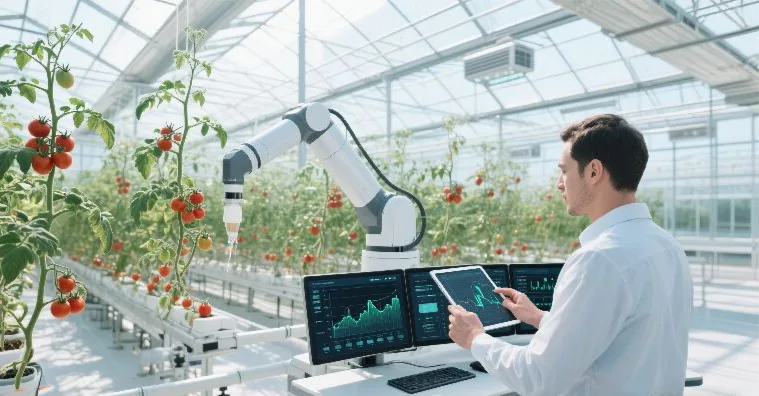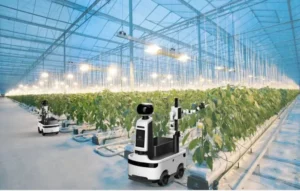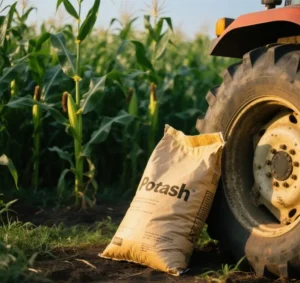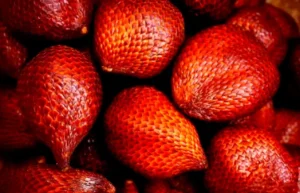In a landmark move to transform traditional farming, China’s State Council recently issued the Opinions on Deepening the “AI Plus” Initiative, a strategic plan that elevates AI-empowered agriculture from a technological experiment to a national priority. The initiative aims to accelerate the digital and intelligent transformation of the agricultural sector, enhancing productivity and paving the way for sustainable, high-quality farming practices. By integrating AI into every aspect of agriculture, China is establishing itself as a global leader in the intelligent farming revolution.
Key Pillars: AI-Driven Transformation Across the Agricultural Chain
The strategy identifies three critical areas for intelligent upgrades, each backed by concrete data and real-world examples.
1. AI-Enhanced Breeding Systems: Accelerating Crop Innovation
AI-driven breeding systems are at the forefront of China’s agricultural revolution. The Chinese Academy of Agricultural Sciences (CAAS) and tech giant Alibaba have developed an intelligent breeding platform that uses AI algorithms to analyze large genetic and environmental data sets. This collaboration has significantly reduced breeding cycles, accelerating the development of high-yield, disease-resistant crops. Additionally, the “Feng Deng” large language model developed by the Yazhouwan National Laboratory and Shanghai AI Laboratory has achieved breakthroughs in molecular biology research. By simulating the processes of molecular biologists, the model has expedited the study of crop gene functions, potentially doubling the speed of cultivar development. Longping High-Tech’s AI-based prediction system for hybrid rice combinations, combined with gene editing, has successfully cultivated a new rice variety rich in coenzyme Q10, which addresses nutritional deficiencies.
Data Highlights:
- Crop innovation speed: AI algorithms have reduced breeding cycles by up to 30% compared to traditional methods.
- Genetic research efficiency: The “Feng Deng” model has achieved 90% accuracy in simulating molecular biology processes.
2. Smart Agricultural Machinery: Redefining Efficiency and Precision
China’s push for intelligent equipment has transformed farming operations. XAG’s “Field Guardian” inspection robot, equipped with LiDAR and AI navigation, can autonomously navigate complex terrains, analyze crop health, and perform targeted fertilization. This reduces fertilizer usage by 20-30% while improving yield quality. DJI Agriculture’s T100 agricultural drone, featuring AI obstacle recognition and AR mapping, has revolutionized spraying and seeding tasks. Its automated obstacle avoidance system increases operational efficiency by 40%, saving farmers time and money.
Data highlight:
- Fertilizer reduction: XAG’s robots achieve 20-30% fertilizer savings through precision application.
- Operational efficiency: DJI’s T100 drone enhances field tasks by 40% through AI automation.
3. Full-Chain AI Management: Optimizing production and risk mitigation
AI-powered management systems are reshaping the entire agricultural value chain. The Institute of Plant Protection under CAAS developed an AI-driven precision spraying algorithm for fruit tree canopies that reduces pesticide usage by nearly 48% while maintaining crop protection efficacy. Sinochem Holdings’ “iMAP” AI model, the first integrated system to combine crop mechanisms, large models, and intelligent agents, provides farmers with region- and crop-specific planting recommendations. This adaptive system improves planting decisions by 25-35%, boosting profitability and sustainability.
Data Highlight:
- Pesticide reduction: CAAS’s AI spraying algorithm cuts chemical use by 48%.
- Decision Optimization: Sinochem’s iMAP improves planting decisions by 25-35% across diverse regions.
Beyond Efficiency: A Paradigm Shift for Sustainable Agriculture
The “AI Plus” initiative is more than just technological upgrades; it reshapes production relationships and fosters a transition to high-quality, eco-friendly farming. By addressing breeding bottlenecks, optimizing machinery, and streamlining management, China aims to achieve the following:
- Food Security: AI-driven precision farming ensures stable yields while minimizing resource waste.
- Environmental Sustainability: Reduced chemical usage and smarter resource allocation mitigate ecological impact.
- Economic Resilience: Data-driven decisions empower farmers to adapt to market fluctuations and climate risks.
Global Leadership and Future Prospects
As a pioneer in agricultural AI, China is setting new benchmarks. Tech giants, research institutes, and startups collaborate to develop over 500 AI-powered agricultural solutions annually, with investments exceeding $5 billion by 2025. The integration of 5G, the Internet of Things (IoT), and AI is expected to create a $100 billion smart agriculture market by 2030, establishing China as a global innovator. This transformation secures domestic food supplies and exports intelligent farming solutions to emerging markets, shaping the future of agriculture worldwide.
A Smart Future for Agriculture
China’s “AI + Agriculture” strategy represents a significant advancement toward sustainable, high-efficiency farming. Powered by AI innovation, China is overcoming traditional constraints, increasing productivity, and redefining agricultural sustainability. As intelligent systems become pervasive throughout the agricultural process, China’s sector is embracing technology and rewriting the rules of modern farming. This transformation ensures food security, environmental stewardship, and economic prosperity, solidifying China’s position as a global leader in agriculture.









